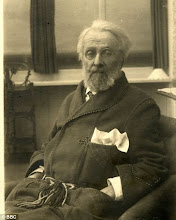In the second world war, there used to be a long-running radio series called ITMA which stood for “It’s that man again”. Such is the identikit interchangeability of the apparatchiks in the present government, that this was my first reaction on hearing of their intention to police, curb and generally censor what is available on the internet. I was confusing Andy Burnham with James Purnell. An easy mistake to make, since neither of them appear in many photos. (At least, not when the photo was taken, anyway.)
Andy Burnham has, apparently, spent £1,986.84 of taxpayers’ money on “media training” during 2008. Judging by his latest sally, we should be asking for a refund.
Now, no-one is defending the sick and illegal sites that show abuse happening to children, or adults for that matter, or animals. But these sites are generally illegal anyway and can be quickly shut down, and/or their adherents pursued through credit card records. Beyond this criminal hardcore, which I again stress is illegal, lies a whole hinterland of “softer” material which some would also wish to ban. There are compelling arguments both ways; those who maintain that pornography on the internet cheapens and demeans the status of women, versus those who argue that its presence sublimates a desire which exists anyway and which, were it not for the “safety valve” element of the internet, would manifest itself in other, darker, more concrete forms. I suspect that no one knows for sure.
The internet, though, can generally be relied upon to police these sites itself, and there are now increasingly sophisticated ways in which responsible adults can prevent children in their care from viewing it. The problem there is not the technology but the irresponsible adults. They could also take a look at the access children have to computer games, particularly violent ones with a pornographic tinge, rather than worrying about the chances of an impressionable teenager stumbling on a home movie of a chartered accountant from Droitwich bonking his wife.
But the government, of course, despite the fact that no-one “owns” the internet, is not content to let matters be. Oh, no.
“There is content that should just not be available to be viewed. That’s my view. Absolutely categorical,” says Mr Burnham, proposing a cinema-style rating system for sites.
Yes, well, we all think that, but the problem is, who decides what should just not be available? I would much rather rely on the collective weight of international law then the decision of one Andy Burnham or his civil servants. Plus, in one of his media interviews (£1,986.84, remember) Mr Burnham used the chilling word “unacceptable”.
This is the crux of the problem. Not “illegal”, which no-one would have an issue with, but “unacceptable”. When we get to the stage of people in government deciding what we can and can’t see on the internet on the basis of what is acceptable and “unacceptable”, then it’s time to worry. That is the thin end of a very large wedge. What is “unacceptable” can grow and change – once the government gets the power of veto over what is acceptable or unacceptable for you and I to look at on the web, then basically anything the government does not like could find itself on the “unacceptable” list. Sites criticizing government policy. Sites promoting animal welfare, even, if they contravene the government's unquestioning support for big pharma and vivisection.
Hermann Goering once memorably said, “When I hear someone mention ‘culture’, then I reach for my revolver” and I’m getting a similar twitchy feeling. Though in my case it would involve adding the words “secretary, Andy Burnham” into that sentence, at the appropriate point.
Subscribe to:
Post Comments (Atom)


No comments:
Post a Comment